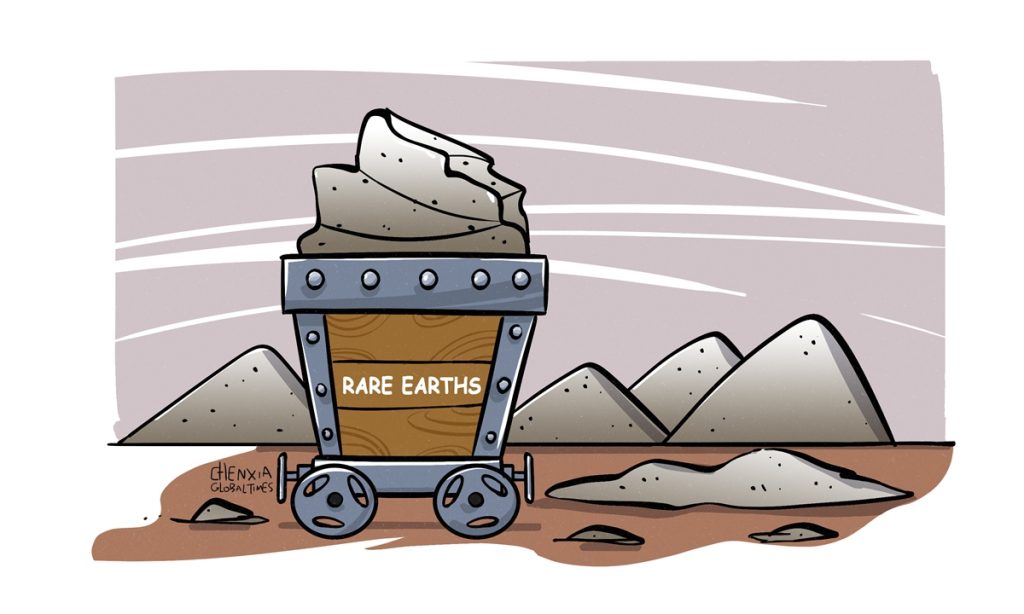GT Voice: Rare earths won’t be tool for US to divide China, Vietnam

It seems that the US has turned its eyes to Vietnam as a key link in restructuring its rare-earth supply chain amid concerns over the potential loss of Chinese supplies. While the US support for Vietnam's rare-earth development looks like a challenge to China, it needs to be made clear that rare earths will not be a tool for the US to drive a wedge between China and Vietnam as the two neighboring countries have the potential to cooperate in the rare-earth industrial chain.
Vietnam plans to restart its biggest rare-earth mine next year with a Western-backed project, Reuters reported on Monday, citing two companies involved. As an initial step, the Vietnamese government intends to launch tenders for multiple blocks of its Dong Pao mine before the year's end, according to the Reuters report.
The development, which came just a few days after US President Joe Biden visited Hanoi and signed an agreement to boost Vietnam's ability to lure investors for its rare-earth reserves, was widely seen as part of a broader push by the US to dent China's dominance in a sector that offers critical materials used in magnets for electric vehicles, smartphones and wind turbines, among others.
Washington's interest in investing in Vietnam's rare-earth industry is not a whim. With rare earths reportedly in short supply globally, the US is in urgent need of restructuring the rare-earth supply chain, and Vietnam is supposed to be a critical part of the supply chain. According to data from the US Geological Survey (USGS), Vietnam has the second-largest volume of rare-earth deposits in the world, topping 22 million tons. Vietnam's production surged from 400 tons in 2021 to 4,300 tons in 2022, with its rank of production going up from 10th to sixth, Reuters reported, citing USGS data.
Of course, the US is well aware of the uncertainties surrounding Vietnam's development as a rare-earth hub, which is why there are geopolitical considerations behind US-Vietnam cooperation on rare earths. It's not just a case of luring Vietnam to sell its cheap rare-earth resources to the US.
It is no secret that China currently supplies most of the world's rare earths, so whether or not Vietnam establishes a rare-earth industrial chain, its development of the industry could be interpreted by outsiders as a potential challenge to China's position in the global rare-earth industry. In this sense, the US plan to rope Vietnam into its restructuring of the rare-earth industrial chain may also drive a wedge between China and Vietnam to a certain extent.
While the US may want to use rare earths to create the illusion of a conflict of interest between China and Vietnam, there is every reason to believe that the cooperation between the two neighboring countries is strong enough to defy such a ploy.
China's production of rare earths is based on the technological breakthroughs and achievements of Chinese scientists in refining rare-earth elements, which is the fundamental reason why other countries can hardly replace China's place in this industrial chain.
China has no intention to compete with Vietnam on rare-earth exports. This is because if Vietnam relies entirely on the US to develop its own rare-earth industry, it is not conducive for the country to seek the maximization of interests from its rare-earth resources, especially when it doesn't possess the most critical processing technologies. In this sense, Vietnam needs to protect its own rare-earth interests by maintaining cooperation with China.
As for China, the warming US-Vietnam relations may serve as a reminder of the importance China needs to attach to further strengthening industrial ties with Vietnam through cooperation.
When it comes to rare earths, China needs to invest more in technological upgrading to ensure its leading position in the industrial chain, which is essential for cooperation between China and Vietnam in terms of rare earths and other industries.